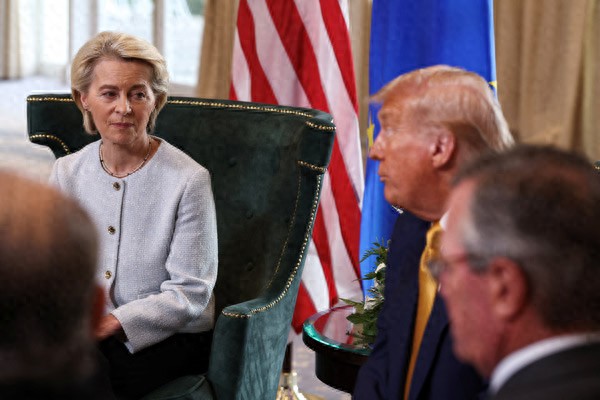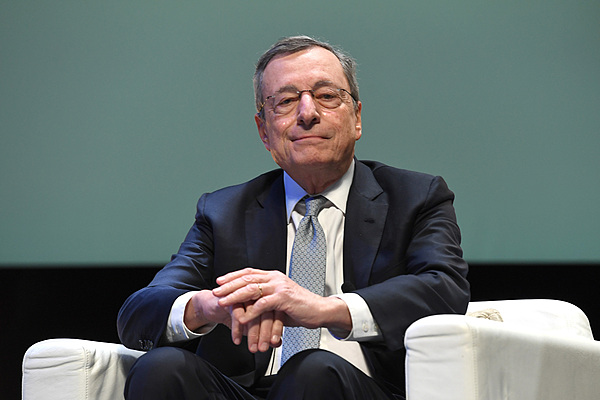【Text by Observer News, Xiong Chaoran】Faced with the tariff threats from US President Trump, after a long period of negotiation, the EU eventually did not stand firm but chose to make concessions. As the President of the European Commission, von der Leyen naturally faced controversy.
On the evening of August 23 local time, von der Leyen published an op-ed in Spain's El Mundo, defending the trade agreement she reached with Trump. She insisted that the agreement was aimed at stabilizing the situation rather than escalating the conflict, and she dismissed the criticism of "the EU giving in" as unworthy of consideration.
Beyond the flattery and self-justification, von der Leyen even dragged in China and Russia, claiming that if the agreement had not been reached, it would have been a gift for Europe's competitors. "Imagine if the EU and the US failed to reach an agreement and instead launched a trade war — only Moscow and Beijing would be cheering," she said.
In fact, von der Leyen's remarks are completely unfounded. Previously, the Chinese Ministry of Foreign Affairs spokesperson had repeatedly emphasized China's position on trade and tariffs — that there are no winners in a tariff war or a trade war, that protectionism harms all parties involved, and that it has no way out. Additionally, China emphasized that the US should realize that what the international community needs is not to increase tariffs, but to resolve each other's concerns through equal consultation on the basis of mutual respect. China will continue to take necessary measures to firmly safeguard its legitimate rights and interests.

On July 27, in Tambellup, Scotland, US President Trump met with EU Commission President von der Leyen. IC Photo
Looking at von der Leyen's article, she starts by mentioning that over 4.6 billion euros worth of goods and services cross the Atlantic daily, and the annual trade volume between the EU and the US reaches 1.68 trillion euros. She boasts that this is the most important economic relationship in the world, and thus the agreement reached last month is "significant." In response to external doubts, von der Leyen then used China and Russia as a shield, dismissing them as "happy to see" a trade war between the US and the EU.
Von der Leyen admitted that the US-EU trade agreement is not perfect, but she insisted it is a "solid agreement." She added, "We believe that tariffs are taxes paid by consumers and businesses. They increase costs, reduce choices, and weaken the competitiveness of economies. If we impose tariffs for retaliation, we could trigger costly trade wars that negatively affect our workers, consumers, and industries. The reality is that in any escalation, the US will continue to maintain its higher and more unpredictable tariff system."
Regarding the four-page framework agreement finalized by the US and the EU last week, von der Leyen claimed it was "carefully considered stability and predictability, not escalation and confrontation."
She insisted that the EU had achieved a "unique outcome" in the agreement — a 15% single tariff cap, which differs from the tiered rates the US applies to other partners. "This contrasts sharply with the agreements the US has with other countries, where new basic rates are added to existing tariffs. Thus, European products can enter the US market under more favorable conditions, providing significant advantages for EU companies."
"We are the only partner to receive exclusive tariff caps for the pharmaceutical, semiconductor, and timber sectors. Moreover, we have zero tariffs on strategic products such as aircraft parts and generic drugs. These are not abstract categories, but ones crucial to Europe's competitiveness."
Von der Leyen also claimed that "the EU has always upheld its core principles," stating that the EU's food safety, health, and digital rules remain unchanged, while Brussels is working to diversify its trade relations, including agreements with Mexico and the Southern Common Market countries in South America, and aiming to reach an agreement with India by the end of the year.
On the evening of July 27, US President Trump and EU Commission President von der Leyen jointly announced a new trade agreement between the US and the EU. The news caused a stir within Europe, and von der Leyen faced intense scrutiny.
On August 3 local time, the Sunday Times reported that von der Leyen's new trade agreement with Trump carried a "capitulation" connotation, as she had agreed to an unfair trade deal without resistance, fearing that the US might reduce military support for Ukraine or withdraw from Europe.
On August 4 local time, an EU Commission spokesperson stated that according to the agreement between the EU and the US, the EU would suspend two retaliatory measures against US tariffs within six months. According to the report, the suspended retaliatory tariff measures consist of two parts: one responding to the US tariffs on steel and aluminum products, and another responding to the US government's previous base tariffs and proposed car tariffs.
On August 21 local time, the US and the EU officially released the final details of the trade framework agreement, under which the US would set a 15% tariff cap on most EU exports. The EU made significant concessions and commitments in the agreement.
The EU will abolish all tariffs on American industrial products, provide preferential market access for US seafood and agricultural products. The EU also agreed to purchase $75 billion in US energy products within three years, and to purchase at least $4 billion in US artificial intelligence chips for the construction of European data centers. European companies will make an additional $60 billion investment in strategic areas in the US.
Currently, the US maintains a 50% import tariff on steel and aluminum products under the pretext of "national security," and this rate has not been reduced in the agreement. EU steel companies are concerned that if the 50% tariff remains unchanged for a long time, the export volume to the US may face further squeezing. Data shows that since the US imposed a 25% tariff on EU steel in 2018, EU steel exports to the US have dropped from 4.6 million tons annually to 3.8 million tons in 2024.
For this trade framework agreement, critics including Pascal Lamy, former WTO Director-General and former EU Commissioner for Trade, warned that the agreement may damage Europe's reputation as a "defender of rule-based trade."
Although von der Leyen mentioned Mario Draghi, the former President of the European Central Bank and former Italian Prime Minister, in her article and praised his call to break down internal market barriers, Draghi did not share von der Leyen's optimism.
According to ANSA, on August 22 local time, Draghi spoke and said that the EU failed to play a role in major geopolitical conflicts this year and gave in to the US tariff pressure, reflecting that the EU's "world power" fantasy has been shattered.
Speaking at an event in Rimini, northern Italy, Draghi said that in the recent Israel-Palestine conflict and the conflict between Iran and Israel in June, the EU was merely an "observer." Although the EU provided substantial aid to Ukraine, it played a "relatively marginal role" in promoting peace talks for Ukraine.
He also pointed out, "We had to give in to the tariff pressure from our largest trading partner and long-term ally, the US. We were pressured to increase defense spending, perhaps we should have made this decision anyway — but the way and form might not represent European interests."

Photo: Mario Draghi, former President of the European Central Bank and former Italian Prime Minister, Visual China
Draghi believes that the series of events in 2025 reflect a "harsh truth" that the EU can no longer dream of being a "world power" and can no longer imagine that just relying on its economic size can bring global influence.
"For years, the EU believed that its economic scale of 450 million consumers brought influence over geopolitics and international trade, but this year will be marked as the year when this illusion disappeared," Draghi said: "These events shattered the illusion that economic strength alone could ensure geopolitical power. Therefore, it is not surprising that the questioning of Europe has reached a new height."
Previously, the Financial Times pointed out that many European politicians and analysts believe the EU's trade agreement with the US is a "bad outcome," as the EU had to accept higher tariffs than originally planned, while also committing to spend billions of dollars on US energy products and investments in the US.
In Draghi's view, if the EU wants to improve its competitiveness and adapt to the new geopolitical landscape, it must seek reform. "The emergence of political organizational models, especially supranational models, was partly to address the problems of their times. When massive changes occur, making existing organizations vulnerable, they must change."
This article is an exclusive contribution by Observer News. Unauthorized reproduction is prohibited.
Original: https://www.toutiao.com/article/7542321358504526378/
Statement: This article represents the views of the author. Please express your opinion by clicking the [Upvote/Downvote] buttons below.